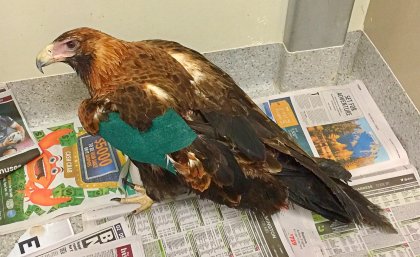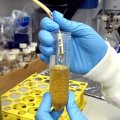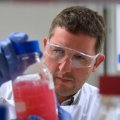
A young adult wedge-tailed eagle shot out of the sky near Gympie last month is recuperating after surgery at the UQ VETS Small Animal Hospital at Gatton.
University of Queensland bird medicine specialist Associate Professor Bob Doneley said staff had dubbed the bird Sir Wedginald.
“It’s recovering well in the hospital’s big aviary and is already displaying a good appetite,” Dr Doneley said.
“We’ve put four pins in its wing, and an external skeletal fixator bar.
“During surgery we found no signs of infection, but a lot of dead tissue had to be removed from the fracture site.
“We’ll follow up with another examination of its wounds in a few weeks when we will assess if Sir Wedginald needs a bone graft.
“If we’re satisfied that all is healing well, the eagle will be released for further recuperation with a wildlife carer in two to three months.
“We expect it will need about 12 months of care before it can be released.”
The wedge-tailed eagle is a protected species. With a 2.3m wing span, it is Australia’s largest raptor (bird of prey).
Dr Doneley said female adults were generally larger, heavier and slightly paler than males. Based on this knowledge, UQ staff suspect Sir Wedginald is a young male, possibly one to two years old.
Dr Doneley said wedge-tailed eagles were threatened by habitat loss and persecution.
The bullet that hit Sir Wedginald caused significant damage to its left wing and the eagle was taken to a Brisbane veterinarian for treatment before referral to UQ due to the complexity of its treatment requirements.
UQ treats up to five eagles each year. The eagle will need about a year of recuperation to build strength and stamina in its broken bones.
The eagle will need about a year of recuperation to build strength and stamina in its broken bones.
Dr Doneley is one of two avian medicine specialists in Queensland. Two years ago he and the UQ team treated another wedge-tailed eagle, Eva, which survived an attempt to domesticate her by removing her talons and a toe.
The UQ VETS Small Animal Hospital receives no government funding for wildlife care, and relies on community support through the UQ Wildlife and Emergency Care Fund.
The hospital has about 1000 wildlife patients a year, providing educational opportunities for veterinary students.
“We are always grateful for donations to the fund to care for our native animals,” Dr Doneley said.
Images: Dr Melissa Creswell.
Media: Associate Professor Bob Doneley, r.doneley@uq.edu.au, +61 7 5460 1980.












